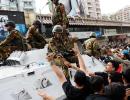'New Delhi has to make up its mind whether it wants to be a friend of the Bangladeshi people or they want to be a friend of a section of people, or one party or one leader'
- SPECIAL COVERAGE: Exit, Hasina

A top Bangladesh Nationalist Party leader said Bangladeshis are "not angry but hurt" over deposed prime minister Sheikh Hasina's stay in India, even as he urged politicians and security strategists in New Delhi to "rethink" their policy given the ground reality here.
In an exclusive interview with PTI at his residence in Dhaka, Abdul Moyeen Khan, a former Cabinet minister of Bangladesh, also said his country shares a border with India on three sides and it is a big neighbour, so there is "no reason why India should not be our best friend".
After unprecedented anti-government protests which reached a crescendo on August 5, Hasina resigned as prime minister and fled the country, even as protesters had termed the fall of the government and her departure a "day of victory".
She landed in India on August 5 and is currently staying there, even as her over two-week-long presence in India has given rise to speculation in Dhaka.
Khan said the current situation is of "consolidation" and coming back to normalcy.
The interim government led by Chief Advisor Muhammad Yunus is trying to stabilise the country and electoral reforms are their "top priority".
Asked if elections are held in Bangladesh what are the prospects for the Bangladesh Nationalist Party led by former prime minister Khalida Zia, he said: "If there is a free and fair elections, our prospects will be decided by the people, and if they want us to be the majority or not, we will respect that, the will of the people is supreme in a democratic system."
The 77-year-old veteran leader is also a member of the National Standing Committee of the BNP, a party that was established in 1978.
He served as a Cabinet minister under the tenure of the then-prime minister Zia.
"The current situation is quite clear. It is amazing how the country is settling back after such a big upheaval. People are trying to get back to their normal day-to-day life, the (interim) government is trying to normalise everything, and they are up to their main mandate which is the transition from autocracy to democracy," Khan said.
Asked how he saw the trajectory of the Dhaka-New Delhi ties because of the presence of Hasina in India, he said it "depends entirely on how India decides".
On Hasina's stay in India after fleeing Bangladesh, he said "Bangladeshi are not angry, but hurt, wounded..as they never expected this".
The former Cabinet minister claimed that New Delhi's behaviour towards Awami League and Hasina has "transformed into anti-Indian feeling in a real sense of the term".
"There is no reason for us to be unfriendly with India unless India behaves in a way that forces the people of Bangladesh to doubt their intentions," he added.
There are reports in newspapers that the United States and United Kingdom governments had "refused" to take Hasina in and under these circumstances, she has found "refuge" in India and this is "public information", the BNP leader claimed.
The Ministry of External Affairs in New Delhi had earlier said the approval for former Prime Minister Hasina to come to India was "granted at short notice".
"The situation is still evolving. At this stage, we have nothing new to share about her plans," MEA spokesperson Randhir Jaiswal told reporters on August 16 when asked exactly under what condition she was in India.
Khan in Dhaka said: "It is up to policy planners, politicians and security strategists in India to decide how long can they house her, and on what ground they can house her, and on what policies they can house her. It is not us to decide. What we have said is what the foreign advisor has said on it."
New Delhi has to make up its mind whether it wants to be a "friend of the Bangladeshi people" or they want to be a "friend of a section of people, or one party or one leader".
The senior BNP leader alleged that policy planners, politicians and security strategists in New Delhi "somehow put their stake in one person and one party, Sheikh Hasina and Awami League" and claimed that it was the "biggest tragedy on the part of India".
"I can't believe such a great nation failed to understand the basic instinct, psychology of the people of Bangladeshi... I sincerely hope India comes out of this mindset," he said.
It is "high time" the policy planners, politicians, and security strategists in New Delhi "rethink their policy and reformulate it in the light of the reality on the ground in Bangladesh. The important thing for the Indian policymakers is to realise the psychology of the people of Bangladesh," Khan said.
The veteran politician said India should "address the people of Bangladesh and not a particular party or person".
Khan described the happenings on August 4-5 as a "spark" in an already "explosive environment" that existed in Bangladesh as a "consequence of activities of the autocratic government".
He said the BNP being the major opposition political party in Bangladesh, played a "dominant role in the process, either by omission or commission".
The majority of the protesting students one saw in the streets belonged to the party, but they "revolted as general students, not as BNP members," Khan claimed.
The senior BNP leader underlined the role of "Gen Z" in leading the recent movement that led to the fall of the Hasina government.
"Old guards will have to make way for the Gen Z. And, Gen Z has shown it," he said.










